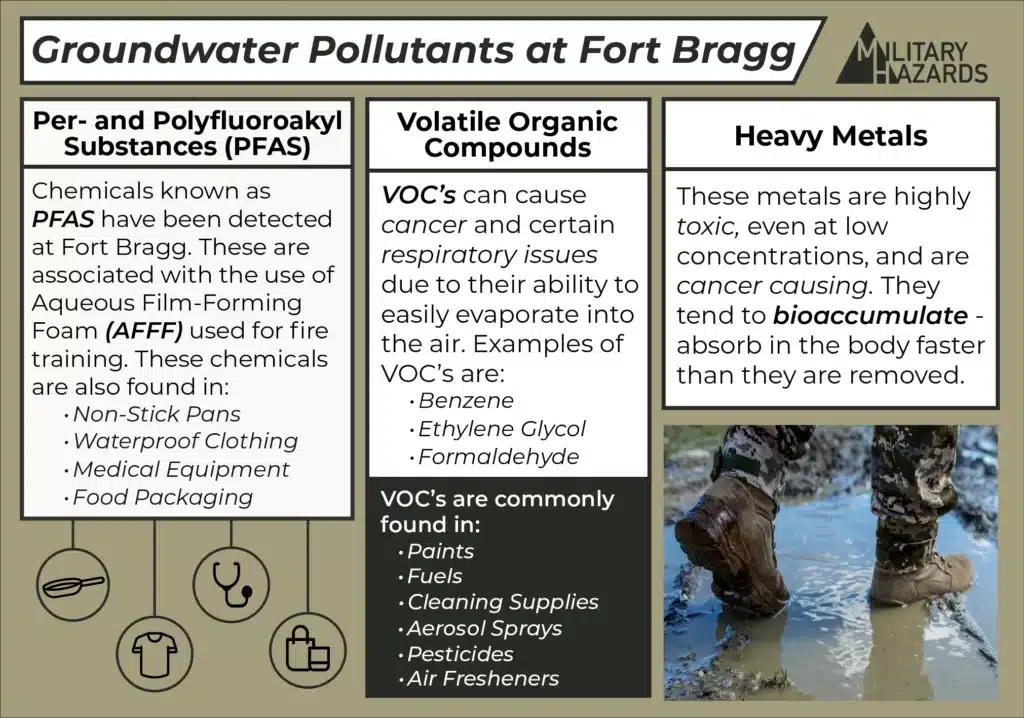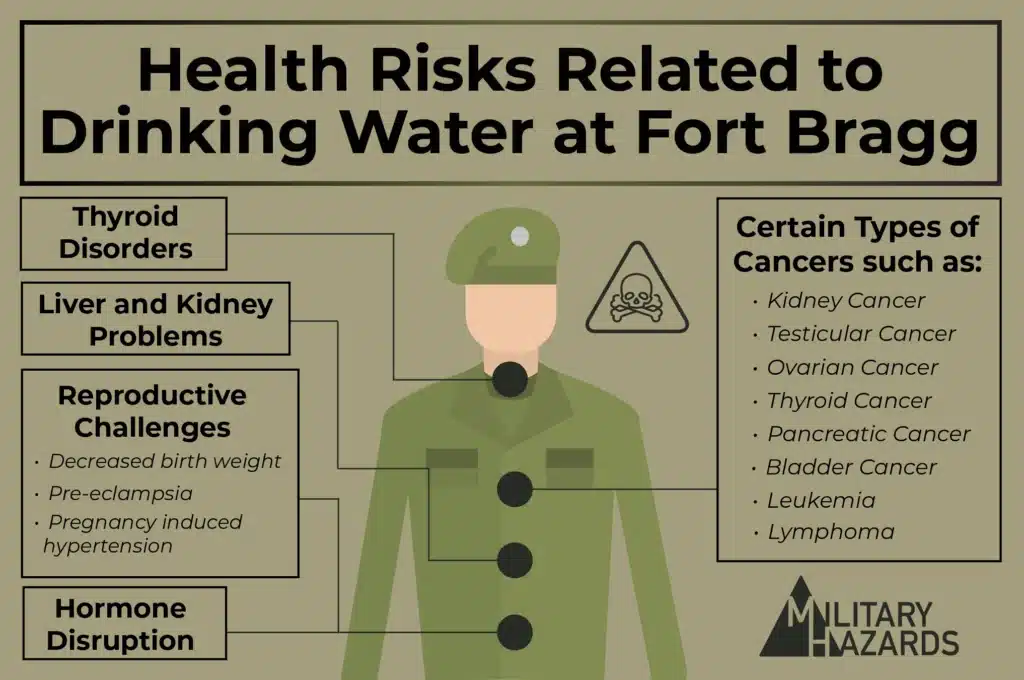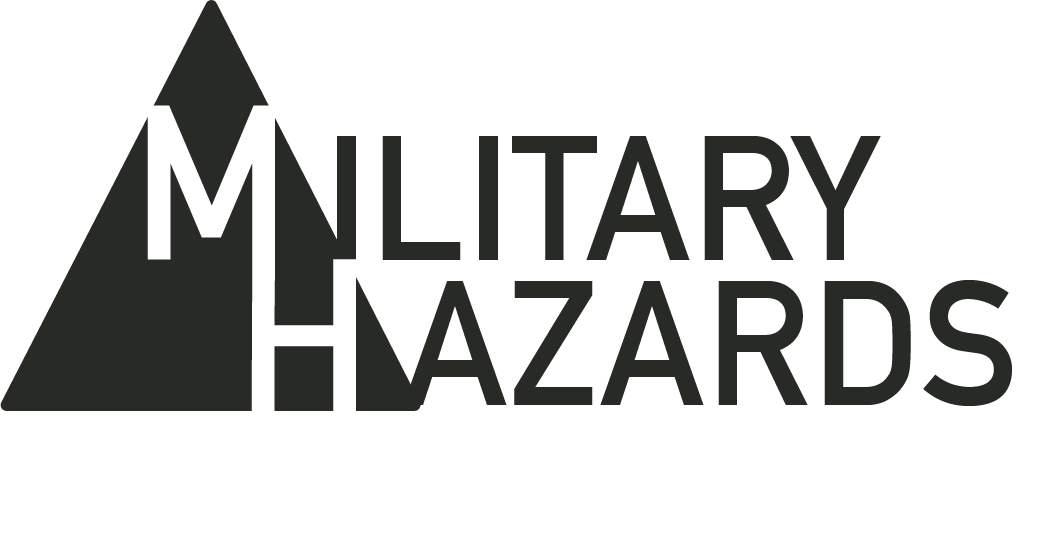Contact Our Legal Partner
"*" indicates required fields

Fort Bragg, Home of the Airborne: Contaminated by PFAS
‘Home of the Airborne’ is one of the military’s longest established military bases since 1918, Fort Bragg (currently known as Fort Liberty) hosts around 50,000 active-duty soldiers in its North Carolina location. In addition to biscuits and gravy in the region, Fort Bragg’s brave service members have also been served a solid helping of toxic PFAS (perfluoroalkyl and polyfluoroalkyl) water contamination.
This has led to widespread public coverage in North Carolina and national media on the Department of Defense’s remediation actions not addressing the problem of toxic forever waste quickly enough.
Quite reasonably, this has led to a lawsuit being launched as people like you seek justice for the devastation caused by PFAS chemicals. If you need help getting your due, military hazards can help you find the best attorney for your needs.
Contamination Updates and News Timeline
July 26, 2024: Contaminated Water at Fort Liberty Affects Local Residents Due to PFAS Chemicals
A July 2024 report indicates that contaminated water at Fort Liberty (formerly Fort Bragg) is affecting nearby residents. The United States Army has admitted that the use of PFAS chemicals for over fifty years has contaminated the ground and the chemicals have leached into the water supply. The new report indicates that over a hundred nearby homes could be affected because the contamination is now flowing in the groundwater. Several tests have revealed dangerous levels of PFAS chemicals in residential wells located near the base.
August 2022: A Department of Defense (DoD) report confirmed PFAS contamination in Fort Bragg’s groundwater, with levels reaching 95 parts per trillion at a remote training location.
March 2021: Fort Bragg authorities announced plans to assess nearby drinking water wells for potential contamination.
2020: The U.S. Army initiated PFAS testing in Fort Bragg drinking water systems as a proactive measure.
2019: The Environmental Working Group (EWG) identified elevated PFAS levels in water sources in proximity to Fort Bragg.

When Did Fort Bragg Start Having Problems With Forever Chemicals?
The base has been struggling for at least 70 years with contaminated water from using fire resistant foams. It begs the question – what have the military been doing all this time to stop unnecessary sickness and cancer causing symptoms as a result of drinking contaminated water?
Some of the more unpleasant side effects of Fort Bragg’s environmental issues include causing widespread problems with breathing and a greater likelihood of getting cancer. The use of firefighting foams containing PFAS, as well as other industrial and training operations, have contributed to soil and groundwater contamination. Studies have identified the presence of PFAS and other potentially harmful substances in the environment surrounding the base. Grassroot efforts like the non-profit Quaker House of North Carolina have tried their best as citizens to advocate for service members and point them to take legal action to get justice. Sometimes, it’s best to get legal advice, and we can point you to available legal resources to take the burden off you.
What Toxins Have Been Found in Fort Bragg Drinking Water?
The main pollutants of concern at Fort Bragg are:
PFAS (Per- and Polyfluoroalkyl Substances): These synthetic chemicals, particularly PFOS and PFOA, have been detected in groundwater at Fort Bragg. They are primarily associated with the use of aqueous film-forming foam (AFFF) for firefighting and training purposes on the base.
Volatile Organic Compounds (VOCs): Some groundwater samples from Fort Bragg have shown the presence of VOCs. Trace amounts of heavy metals have also been found in certain water samples at Fort Bragg, all of which have the potential to cause cancer and breathing problems.

The Current State of Water at Fort Bragg
Recent water quality reports indicate that Fort Bragg’s drinking water currently meets federal and state health standards. However, ongoing monitoring at Fort Bragg is necessary due to the historical presence of contaminants which continue to plague the base and the local community.
The Dept. of Defense’s Efforts in Removing Forever Chemicals at Fort Bragg
Fort Bragg has implemented several measures to address water quality concerns:
- Regular testing and monitoring of drinking water sources.
- Installation of filtration systems where necessary.
- Ongoing environmental assessments and remediation efforts.
However, the fact it has taken so long to even begin to address the health problems caused by PFAS is an aggravating factor behind service members long-term health difficulties in the NC region.
Health Risks and Symptoms Linked to Drinking Water at Fort Bragg
Exposure to contaminated water can potentially lead to various health issues, including:
- Certain types of cancer
- Thyroid disorders
- Liver and kidney problems
- Developmental issues in children
However, it’s important to note that the presence of these contaminants doesn’t necessarily mean that all individuals exposed will experience health problems.

Fort Bragg Contamination Lawsuit: Am I Eligible?
To be eligible for the Fort Bragg water contamination lawsuit, individuals typically must meet specific criteria:
- Documented exposure to contaminated water at Fort Bragg
- Diagnosis of a condition potentially linked to the contaminants
- Evidence of residence or employment at Fort Bragg during the contamination period
How Much Can You Get in a Fort Bragg Water Contamination Lawsuit?
Victims of water contamination at Fort Bragg may be eligible for significant compensation, though exact amounts can vary widely based on individual circumstances. Key factors that impact potential payouts include:
- Type and severity of health condition(s) developed
- Duration and extent of exposure to contaminated water
- Strength of evidence linking the condition to the contamination
- Age at time of exposure and diagnosis
- Impact on quality of life and ability to work
While no guaranteed amounts can be stated, settlements for similar military base water contamination cases have ranged from tens of thousands to hundreds of thousands of dollars. Some examples of potential compensation ranges based on diagnosis:
- Cancer diagnoses: $100,000 – $500,000+
- Serious non-cancer conditions: $50,000 – $300,000
- Less severe conditions: $20,000 – $100,000
However, each case is unique. An experienced attorney can provide a more accurate assessment based on the specific details of an individual claim. They can also help gather evidence, file claims properly, and negotiate for fair compensation.
It’s important to note that as more cases are filed and settled, compensation trends may change. Staying informed on latest developments is advisable for potential claimants. Consulting with a lawyer specializing in military water contamination cases is recommended to understand current eligibility criteria and potential compensation.
How Can I File a Claim For Water Contamination at Fort Bragg?
To file a claim for Fort Bragg water contamination:
1. Collect documentation of your time at Fort Bragg and medical diagnoses.
2. Contact an experienced law firm.
3. Confirm eligibility with your lawyer.
4. Assist in gathering evidence.
5. File the claim with your lawyer’s help.
6. If approved, discuss compensation timeline with your attorney.
Tip: Obtaining military and medical records in advance can expedite the process.
How Long Do You Have To File a Legal Claim against Fort Bragg?
The statute of limitations for filing contamination claims can vary based on state laws and case specifics. It’s crucial to consult with an experienced attorney to understand the applicable deadlines and ensure your claim is filed within the required timeframe.
We Can Help You Take Legal Action at Fort Bragg
At MilitaryHazards.org, our team partners with attorneys that specialize in military base water contamination lawsuits, including those related to Fort Bragg. Their attorneys have expertise in environmental and military-related cases, particularly those involving PFAS contamination.
